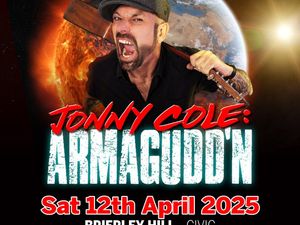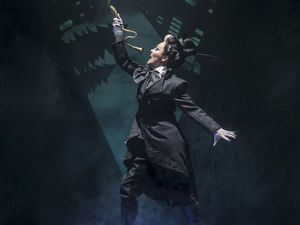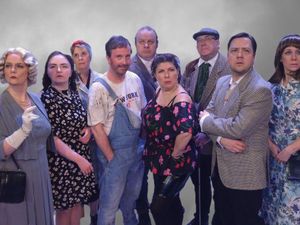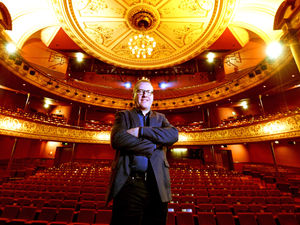Geoff Norcott talks ahead of Midlands and Shropshire shows
He’s been around the comedy block for a number of years, but Geoff Norcott has shifted up numerous gears from being a stalwart club comic to an Edinburgh Fringe draw to a touring comedian with a growing number of TV and radio credits under his belt.

He’s appeared on the likes of Live At The Apollo and Mock The Week, and as ‘the voice of conservative Britain’, is a regular correspondent on The Mash Report, while receiving critical acclaim for his documentary, How The Middle Class Ruined Britain.
His Radio 4 special Right Leaning But Well Meaning scooped a prize at the BBC Radio and Music Awards, and he has a diverse range of writing credits on his CV such as Have I Got News For You, Roast Battle, 8 Out Of 10 Cats and Judge Romesh.
Geoff is now an established name at the Edinburgh Fringe having performed well-received shows there such as Conswervative, The Look Of Moron and Traditionalism, and he’s now heading out on the road for an extended tour of Taking Liberties.
Here he talks about being a right-wing comedian in a business that is fundamentally left-leaning, why he will feel a little bit of pressure on tour, and how a previous life as a teacher has informed his stand-up career.
The show comes to Bromsgrove Artrix on March 4, Wrexham's William Aston Hall on March 7, and Shrewsbury's Theatre Severn on March 25.
Ahead of the tour, we ask Geoff some quick fire questions...
Taking Liberties is your latest show. As you take it out on tour, are you expecting to rewrite sections given how quickly the British political landscape shifts around?
The general election meant that there was a whole section that needed rewriting which is both annoying and exciting.
I got to the point with Corbyn that he seemed like an easy target; it started to feel like bullying a pensioner.
The Labour leadership race and the challenge the Labour Party now face is new territory; I always like to delight in offering the left advice when I’m probably really just taking the p***.
At its heart, the show is about being told what to do and being told off, and I think a lot of people hate that.
It’s not a right-left thing, but that guides a lot of my political views; we all like to imagine our politics to be a pure dissertation of the world around us, whereas I’ve started thinking that it’s more about emotional reactions to things.
So now, whether it’s people telling you what words to use, food to eat or where you can fly, I just don’t like being told what to do.
What other topics will you be tackling in the show?
Another thing is about automation and how we’ve already outsourced a lot of our capabilities to technology.
Take driverless cars: I like driving and I think it’s healthy to be in charge of your own safety and location.
To my son, who’s almost four, my ability to be able to drive to places without google maps is going to make me seem like a wizard.
One of the other bits in the show is reasserting the right to make sweeping generalisations about men and women. As gender increasingly gets portrayed as a construct, I think men and women, on the whole, are all boringly predictable.
So, yes, I generalise, it’ll make sense to some and not to others, but people can react by laughing or not laughing. There’s no need to get bent out of shape about it.
What are your feelings about touring the nation?
You turn up at a place and you have 500 people there to watch you: that’s a privilege, I always try to remember that.
There is more pressure definitely, especially when I see cars parking up and people heading for a pre-show Nandos; I think, ‘this is a night out I could mess up’.
For a certain kind of comedian, that would feed their ego whereas for me, I’d just be thinking ‘have they got a hotel room? How much did the babysitter cost?’ So, I try to make sure I deliver on my end of the bargain.
You’re an outspoken comedian of the right. How does it feel to be in an industry that is still viewed as overwhelmingly left-leaning?
One of the joys of doing things like the Edinburgh Fringe in the past was that feeling of being behind enemy lines. It was very exciting and it did feel risky.
When I did my show Conswervative, there were nights in the room when it was tense, which was kind of terrifying.
The Mash Report recordings are like that to a point; the audience is good to me, but in the last series particularly around Brexit, if I made flippant jokes there were one or two tricky moments in the studio.
I’ve never taken myself that seriously, though. I think I have good points to make, but I don’t make them unless the joke is funny. Otherwise, it’s just a bloke preaching.
One newspaper dubbed you as ‘an out and out rebel’. Do you recognise that description of yourself?
I like that but there is this weird feature of the age where you can be seen as controversial for holding views in line with the vast majority of people.
The thing I love about the woke-erati is that they make someone like me seem edgy and controversial.
It’s not that I get up every morning feeling anti-woke; I like treating ideas on their merit and unfortunately a lot of the worst ideas I encounter come from that field of discourse.
I’m not sure you’ll ever get older Labour voters from Ashfield to introduce themselves with their preferred pronouns.
You started stand-up while you were still working as an English teacher. Are there any links between the two professions?
Certainly when I was a supply teacher there was a quick need to establish yourself in front of a room full of strangers.
The teacher training process was very much subject-led and practice-led but you can’t really do all that until people give a shit about what you’re saying in the first place.
When I started doing the rowdy weekend circuit, you could draw a huge Venn diagram between the two.
There generally wasn’t a problem of any bleeding between the two things, but I did do one gig very late and was in school very early the next day, and I came very close to doing a putdown on this nerdy lad.
If he’s reading, I apologise, but it’s a long drive back from Truro.





